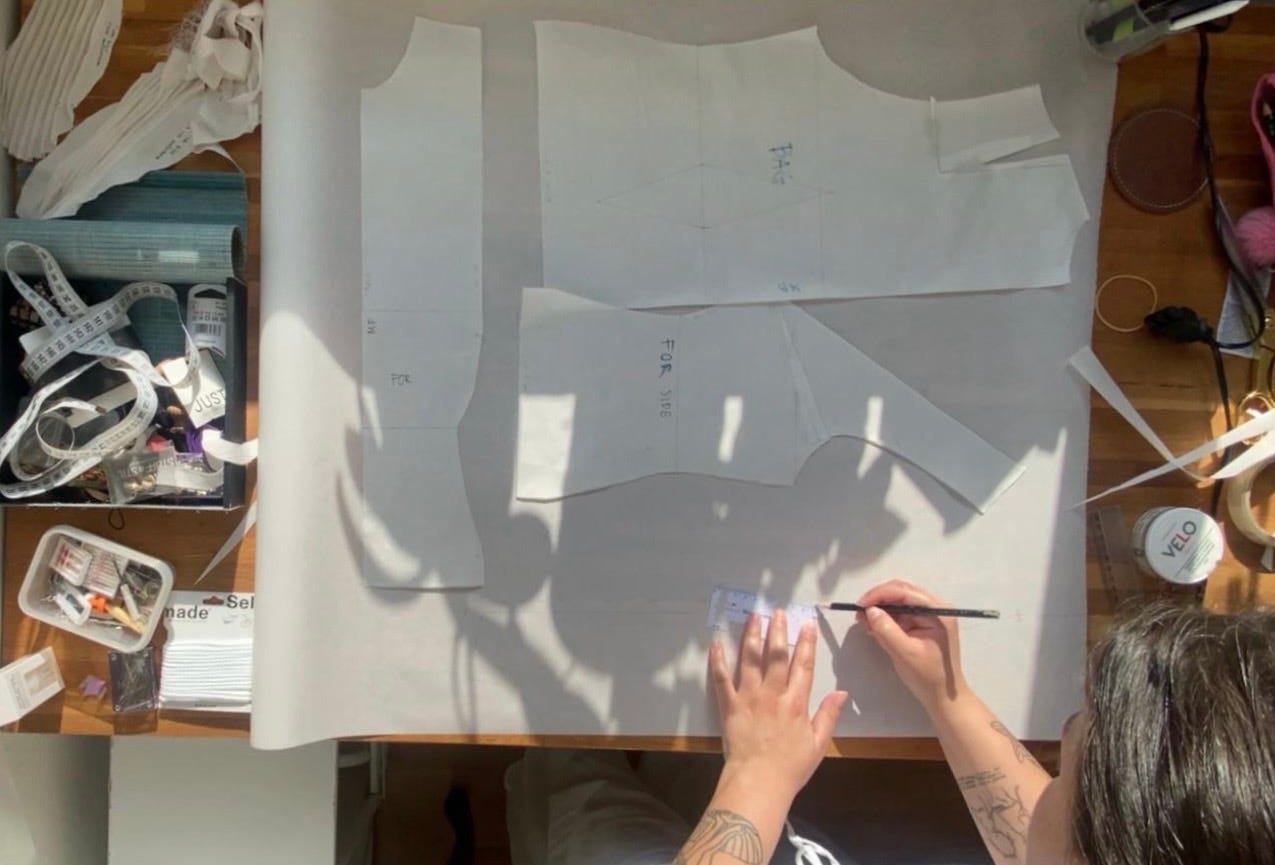Do you wear clothes? Have you ever really thought about what that means?
The clothes we wear say a lot about us. So what are your clothes saying about you?
My name is Naja, I’m the designer at Carnelia and I'm studying Textile Design, Craft, and Communication at University College Copenhagen. Clothing is deeply woven into my everyday life - professionally, personally, and in the intersection between the two. But fashion doesn’t just affect those of us working with textiles. It impacts all of us – through the messages our clothes send, and through their environmental effect on the world.
As a textile student, I spend a lot of time thinking about what I make, wear and buy. I try to build my wardrobe as sustainably as possible, but I’m also just a busy student living on a tight budget, so I can’t always afford high-quality garments or find the time to sew my own.
Psychologically, buying new stuff feels really good. In fact, studies show that 50% of men and 70% of women see shopping as a form of entertainment¹.
Cheap prices mean people come back more often – unlike luxury fashion, which is slow and expensive. The rapid cycle of fast fashion, combined with the speed of social media (think of Tiktok “Shein hauls” and micro trends), creates FOMO. We buy fast to stay relevant. And when that’s the norm, it fuels a throwaway culture with devastating effects on the environment.
In 2020 alone, the average person’s clothing consumption emitted 270 kg of CO2. Globally, textiles release 121 million tons of CO2. And only 1% of used clothing is recycled².
Cheap clothing is inherently unethical. A T-shirt that costs 29 DKK (~ €4, as seen on Shein) cannot possibly cover the cost of fabric, dyes, design, stitching, and fair wages for the people who made it. And even if it's cheap, that T-shirt probably won’t last.
But expensive doesn’t always mean better. Many brands use recycled polyester fabrics, which are created by recycling plastic bottles. Sounds good, right?
Not quite. Once those bottles become fabric, their life cycle ends. Plastic bottles can be recycled into new bottles up to 15 times – but fabric? That’s a one-way street. When the garment tears or inevitably goes out of fashion, it ends up in a landfill or incinerator. So no, it’s not at all sustainable³.
So what should we do? If both cheap and expensive clothes come with a cost, what’s the solution?
The ideal fashion consumer would wear what they already own. Mend it when it breaks. Tailor it to fit if their body changes. Learn to sew! It’s easier than it looks. And if you really need to buy something new – choose garments made from natural materials, ethically produced by workers who are paid living wages and treated fairly.
But let’s be honest – it can feel hopeless trying to live sustainably in a system that isn’t built for it.
That feeling? That’s the knot in my stomach when I think about the future – yours and mine. As citizens, we all have a responsibility to do what we can for the environment. But real, structural change won’t happen without policy. And the EU? It’s moving too slowly – and the changes so far aren’t nearly radical enough.
Still, maybe there’s hope. If we all reflect more deeply on what we wear, demand better from brands, and push for stronger laws, we might shift the industry. As individuals, we can’t fix everything. I’m not at all perfect either. But as consumers, we do have power. And that power increases when we raise awareness – among ourselves and among those in charge.
As a clothing brand – and as a part of the unsustainable system set up for everyone - we at Carnelia are trying to do our very best to craft better products for you, for us and for the planet.
This newsletter is a call to action. A reminder that textiles matter and that the choices we make – on the most ordinary days – can shape the world we live in.
¹ Lin, A. (2024), Driven to Shop: The Psychology of Fast fashion, Earth Day.org
² European Parliament. (2020), The Impact of Textile Production and Waste on the Environment (infographics), europarl.europa.eu
³ Changing Markets Foundation (2021), Synthetics Anonymous - Fashion Brands' addiction to fossil fuels, p.23, changingmarkets.org





